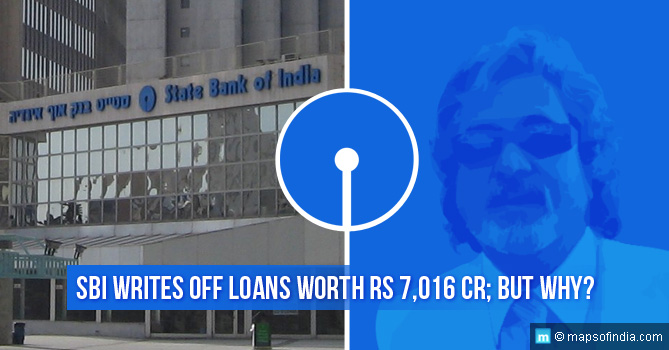Reports came in on November 16, 2016, that the State bank of India (SBI) has written off Rs 7,016 crore worth of loans of 63 of its top 100 wilful defaulters. According to the report, of the 100 defaulter accounts, 63 have been written off, 31 partially written off, and six are now Non-Performing Assets (NPA).
What is a Non-Performing Asset?
A non-performing asset (NPA) includes those loans on the books of financial institutions that are in default or are in arrears on scheduled payments of principal or interest. A debt becomes an NPA when the interest or the principle has not been paid for a period of 90 days. Under the governorship of Raghuram Rajan, the Reserve Bank of India (RBI) started the balance sheet clean-up drive of financial institutions by bringing out the hidden bad loans. This saw a rise in the NPAs for the SBI from 4.25 percent as of March 30, 2015, to 7.14 percent as of September 30, 2016. In fact, all the banks are seeing a rise in the NPAs, which is a massive roadblock in the financial development of any country and therefore, a worrisome trend. However, the present write-off has to be seen in the context of the demonetisation drive that the government has kicked off. The object of demonetisation seems to be affecting the common man more, and the public feels that while they are being inconvenienced, the government is doing nothing about the stressed assets of the banking sector. Writing them off will just give the defaulters relief. As a controversy arose over SBI reportedly writing off the loans, the government and the bank on Wednesday maintained that there was no loan waiver and the liability on the borrowers still remains. Both CPI (M) leader Sitaram Yechury, and Congress leader Anand Sharma, raised the issue of the write-off in their speeches during a debate in the house on the government’s demonetisation action. In response, Finance Minister Arun Jaitley asked opposition members in the Rajya Sabha not to go by the literal meaning of write-off and added, “It (write-off) does not mean that the loan ceases to be a loan. We will still chase the loan. The entry in the book changes, that is from being a performing asset, it becomes a non-performing (asset) one.”
What does a write-off mean and how does it affect the public?
- When a bank extends a loan to any person or entity, it appears as an “asset” in the balance sheet of the bank; and the interest accrued from it, the income from the asset.
- If the person or the entity stops paying the interest, and repaying the principle amount through monthly instalments, the bank will naturally generate lesser revenue in spite of the asset in form of the loan showing in the balance-sheet.
- As per norms set by the RBI, after a 90-day window, when there is no income from an asset, the bank has to term it as a loss of asset and eliminate it from the balance-sheet.
- The loss incurred by the bank will be borne by the public exchequer.
- A major portion of it is done by the government, which loses tax revenues as the losses are set-off against tax.
- Indirectly, it is the public that is paying for defaulters such as Vijay Mallya.
The Defaulters
Among the wilful defaulters, the top five include:
- Vijay Mallya’s Kingfisher Airlines: Vijay Mallya leads the list of defaulters with dues of Rs 6,963 crore to 17 banks, of which SBI’s loan is Rs 1,201 crore.
- KS Oil: KS Oil was declared NPA in 2013 with effect from September 30, 2011, and follows Mallya at close heels with dues of Rs 596 crore.
- Surya Pharmaceutical: The company was named a wilful defaulter in 2013 with dues worth 526 crore.
- Ajay Kumar Vishnoi’s GET Power Ltd: GET Power owes the SBI 514 crore and has been declared wilful defaulter as of August 23, 2016.
- Sai Info: Sunil Kakkad’s Sai Info has dues worth 375 crore and has been termed wilful defaulter on August 26, 2016.
There was public outrage on Wednesday with the Twitter buzzing with tweets on the topic from the opposition leaders.
- VERY INTERESTING, SBI! JUST REMINDING YOU, THAT WRITE-OFF BELONGS TO THE SUFFERING MILLIONS IN QUEUES ALL OVER INDIA. #DEMONETISATION – SANJAY JHA (@JHASANJAY) NOVEMBER 16, 2016
- 33 PEOPLE HAVE DIED & MILLIONS SUFFER IN LONG LINES AS VIJAY MALLYA GETS A 1200 CR SBI LOAN WRITE-OFF FROM MODIJI! – RANDEEP S SURJEWALA (@RSSURJEWALA) NOVEMBER 16, 2016
- RS 7000 CRORE OF UNRETURNED LOANS, INCLUDING RS 1201 CRORE OF KINGFISHER WRITTEN OFF. SO MUCH FOR THIS GOVT ‘MAKING THE RICH PAY’. – SITARAM YECHURY (@SITARAMYECHURY) NOVEMBER 16, 2016
The Supreme Court has called the write off ‘a big fraud’ and ordered the RBI to share the names of the biggest defaulters for more transparency. Following the criticism on various social media channels, Finance Minister Arun Jaitley, on the first day of Winter Session of Parliament 2016, reiterated: “So, there is a little bit of malapropism involved in this. Don’t go by literal meaning write-off. Write-off does not mean loan waiver. Loan still remains. You still continue to pursue.” He said that it is just a change in the entry in the books of the financial institutions, that is, marking performing assets as NPAs. SBI chairman Arundhati Bhattacharya said that the defaulters have been clubbed under different heads and efforts are on to recover loans from such defaulters. “These are not write offs. They are old entries done over time. We have fully provided for these loans so they are put into an account called ‘Accounts Under Collection’. There is a very robust process for following up all these loans for recovery including monthly review by management and quarterly review by board. No let off of borrowers happened and all processes are focused for full recovery. The words “write off” are technical terms and used in the layman’s way of understanding these words is completely misleading,” she told.
Demonetisation Should Remain the Boon that it is meant to be
Prime Minister Narendra Modi banned the old Rs 500 and Rs 1000 notes, with the aim of curbing black money in the economy of India and to get hold of those who are hoarding unaccounted cash. The common man in the last few days has been facing the brunt of the decision, struggling with the inconvenience of lack of cash in hand. According to experts, the poor with no plastic cash in hand would be hardest hit. However, each one of us has faced the situation with gumption because we know it is for the larger good of the nation. But the move to write off loans of defaulters does come as a shock and has caused public outrage. Hopefully, the defaulters will pay the price for cheating the country, its people and the economy; whereas the demonetisation move by the Prime Minister will remain the boon that it is supposed to be.
Read More…
UK, a Safe-house For Fugitives From India
Can India really become cashless?
NPA Woes Hound Indian Banks
The Sahara Land Sale: Facts You Must Know
What is Vijay Mallya’s Net Worth?
Rise and Fall of Vijay Mallya
SpiceJet’s Future – Still Hanging in the Balance





